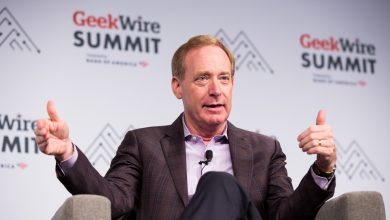Q&A: Rep. DelBene on data privacy, rural broadband and the Biden administration’s tech agenda
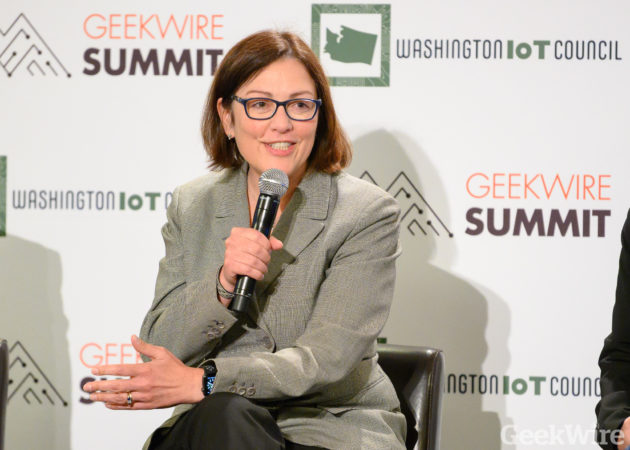
When President-elect Joe Biden and the incoming Congress take the helm this January, they will face several unresolved tech policy issues.
The Trump administration is leaving behind pending antitrust actions against Big Tech and unanswered questions about data privacy and content moderation online. More fundamentally, communities across the country still lack reliable internet access amid a pandemic that has laid bare how essential connectivity is for remote learning and work.
GeekWire recently discussed those issues and more with Rep. Suzan DelBene (D-WA), who has represented Washington state’s First Congressional District for the past eight years.
DelBene brought 12 years of leadership experience at Microsoft with her to Congress when she was first elected in 2012. During her time in office, she’s pursued a tech policy agenda, introducing bills that would establish data privacy regulations and extend law enforcement warrant standards to emails. She is the chair of the House’s Internet of Things Caucus and during the next Congress she will chair the moderate New Democrat Coalition.
Earlier this month, DelBene reintroduced the Email Privacy Act, which would require law enforcement officials to obtain a warrant to access emails and other digital records. The bill would also allow companies providing email service to notify their customers when documents are seized. Currently, law enforcement can seize any email older than 180 days without a warrant.
It’s one of several tech issues DelBene hopes will move forward under the Biden administration. Continue reading for our edited conversation with DelBene about what she hopes to accomplish.
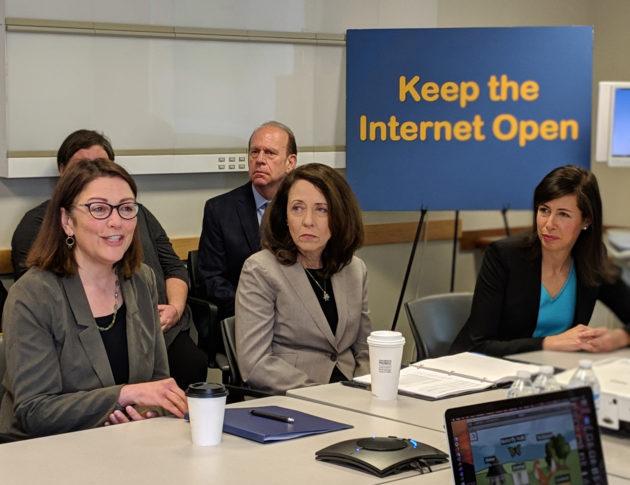
GeekWire: What are your top priorities as chair of the New Democrat Coalition?
DelBene: Both now, and as we head into the next Congress, the top priority is the response to the pandemic, both the public health and the economic response. That will continue to be our focus and hopefully we can look at not just relief, but also recovery, as we start to see vaccine distribution and an ability to focus on how we open up and provide more resources to stimulate the economy.
Infrastructure will be a key area there. It’s a place that has bipartisan support, something we’ve been working on, but also [it will] be critical to helping get folks back to work and create a foundation for the economy going forward. Surface transportation, rural broadband, housing — all of those are the big umbrella infrastructure.
We then clearly have work to do in a lot of areas, in working with the new administration to help get our country back on track, helping address issues of the climate crisis, making sure that we look at voting rights and focus on making sure that everyone has access to the ballot going forward with the John Lewis Voting Rights Advancement Act. With respect to the economy, clearly technology and privacy are also a priority as we head into the next Congress.
GW: Have you seen any signs that the incoming administration will make consumer privacy a high priority?
DelBene: I have brought the issue up but I haven’t had detailed conversations with them on data privacy specifically. It is an issue that is brought up over and over and we’ve seen how important it is that we focus here, but I can’t give you more specifics in terms of the new administration’s view on how they want to address privacy. That’s why I think it’s been important that I introduce legislation and help do a lot of the education for folks on the need for federal data privacy protections. I’ve spoken to the Biden transition team about this so I look forward to working with them.
GW: Assuming it does get picked up, do you think that a national privacy standard will likely be modeled after California’s law?
DelBene: We need to make sure that we have federal legislation, number one. There’s been a few different ideas and approaches that folks have had. Clearly we have GDPR and we have California’s law that are in place right now but we need to have the collective conversation about what’s going to work not only domestically but also how our policy will work as we set standards internationally.
I put forward the Information Transparency and Personal Data Control Act because I think it’s important that we have federal legislation, and that we have strong clarity on what privacy policy is so that consumers have clarity, so that we have strong enforcement authority. I have the FTC as the enforcement authority in our bill. We have a role for attorneys general to also play. Those are all pieces that I think are going to be critical in federal legislation. I look forward to having that conversation with folks so that we get something through because right now, in many parts of our country, folks don’t have privacy protections in place.
GW: Do you see any route to a federal privacy law with a Republican-controlled Senate?
DelBene: Yes, I don’t actually think that this is a partisan issue. I think that it’s something that we can have bipartisan support on. Our biggest challenge has been education, really. Not all members of Congress feel comfortable with this use of technology, making decisions on the implications of policy, so a big role that I’ve tried to play and I think is going to be important going forward is to educate Congress on not only why we have such an urgent need for a federal privacy standard, but also what that might look like and the things they need to take into consideration. I do think that there’s an opportunity to build bipartisan support.
GW: Are you planning to re-introduce the email warrant standards bill and do you think it has a higher chance of moving forward next Congress? (Editor’s note: This interview took place before DelBene re-introduced the Email Privacy Act.)
DelBene: Yes. The Email Privacy Act is the official name of the bill and something that I’ve been working on for a few years, too. Again this has been bipartisan and it’s pretty straightforward. It’s really about making sure that we have constitutional rights represented in the digital world.
GW: Because it does seem like a bipartisan issue, not a particularly polarized one, why do you think it hasn’t gained more momentum in the past?
DelBene: We’ve definitely heard from folks in the administration before who want to have access to information and don’t want anything to be blocked. That’s not the way our system works. We have a warrant standard and I think that warrant standard also needs to apply in our digital world. That’s consistent with what people expect. Most people don’t know that there is a caveat for emails on a server over 180 days. This is something that we just need folks to understand and we’ve done a lot of education there and realized that these are basic constitutional rights that we need to make sure are also enforced in the digital world.
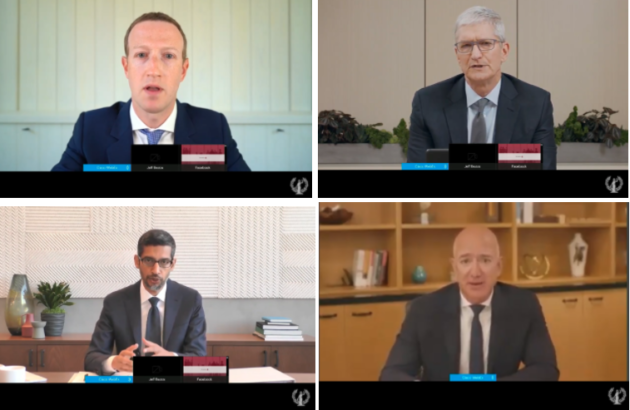
GW: What kind of antitrust enforcement of the tech industry can we expect over the next four years?
DelBene: We’ve definitely heard from folks on the Judiciary Committee who are looking into this in a detailed way. We should hold big companies accountable when they engage in anticompetitive behavior. That’s important and we’re going to continue to see folks looking into that. We need to have opportunities for small entrepreneurs so that they can move forward and be innovative in creating technologies that help build the industries of tomorrow. The House Judiciary Report laid out their ideas of how they want to start tackling this issue and making sure that we have competition there is going to be a top priority.
GW: Based on that committee’s report, do you think antitrust enforcement is needed for Amazon, one of the giants in your state?
Related: The case against Amazon: Key takeaways from the U.S. House antitrust report on digital markets
DelBene: This is one of the things that the Judiciary Committee needs to look at. It’s frankly true for any type of business and not just in the technology sector. But to understand what is happening in that sector, to understand if there is anticompetitive behavior and to hold companies accountable, that’s an important standard and I do think it’s important that the Judiciary Committee moves forward here. As they gather information, I think they will be putting forward their recommendations on what the next steps Congress should take are.
GW: They said in their report that they did find anticompetitive behavior so I’m just curious what kind of remedy you think might be useful.
DelBene: They will continue to do more work and obviously working with the administration as well, because this is something that’s important in all sectors that we hold companies accountable to follow our laws, including making sure that there is not anticompetitive behavior happening. That’s going to be work that they’ll continue to do and I think we’ll see a lot more happen in the next Congress.
GW: Do you expect the next COVID relief package to include any programs to help rural Americans get online? (Editor’s note: Congress approved $7 billion as part of the latest COVID relief package.)
DelBene: I hope so. There’s two pieces. There’s what we can do in terms of providing resources to help provide connectivity that folks have stood up right away — hot spots, other solutions. But this is also a long-term issue in terms of making sure that we are doing appropriate mapping, and making sure that we are getting broadband to every part of our country.
If you look at my district, where there’s urban areas and a technology center, you can go an hour away from that part of my district and be in a place where we don’t have broadband or even good cell service.
The short-term solutions are hard. Mountains, they don’t have line of sight, they don’t have cell service to piggyback on. So as we are looking at how we address this issue we’ve got to put resources in to make sure that it gets done. That means not only the dollars but also the mapping and making sure that we’re seeing progress in getting connectivity in those areas that have, for so long, been without any type of connectivity.
Then, making sure that we’re getting it to a level that’s really functional and useful for a child to be doing remote learning or for someone to be doing telework. Because right now, even in places where there is some connectivity, it’s not enough for folks to do some of the things they might be trying to do today.
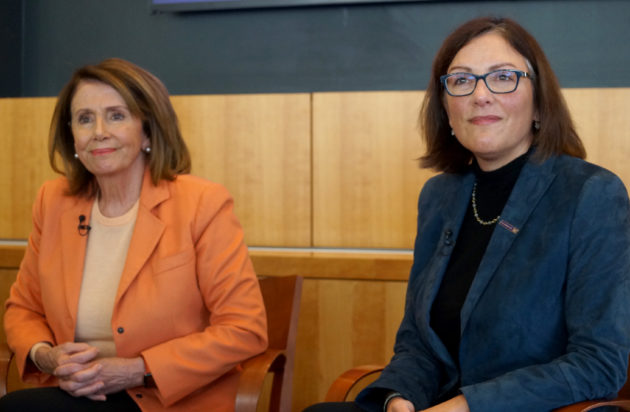
GW: What’s the most realistic way to ensure that rural Americans have broadband access long-term?
DelBene: One, mapping is going to be critically important. It is important to visualize where connectivity is available, where it is not, and to show that visible progress that we are making a difference in those communities. Sometimes there has been more of a focus on providing higher-speed access in some areas than getting access to areas that don’t have anything. The mapping is important. Showing that progress and having a plan to make sure we’re hitting all communities, not just some, is important.
We have everything from legislation to make sure that when roads are being torn up … that you “dig once,” is how we refer to it, so that you can make sure that you’re putting appropriate infrastructure in if you’re digging up. You can do that groundwork then, versus having to dig a second time.
We have different technologies that we might be able to use. What we can use to get connectivity in the mountain communities in my district may be different than what we can use to get connectivity in other rural parts of the country. You’re going to see combinations of all of that, bringing different technologies to bear and making sure that we have resources to support that.
This is an important public sector need. I do think this is an important role that government plays to make sure that we are getting connectivity to everyone. Not just to places that may be a priority for some or may even be a private sector incentive. We’ve got to make sure we’re getting it everywhere. It’s got to be a combination of that mapping, that accountability, and using different types of technology to get connectivity quickly based on the different needs, both geographic and needs in our communities, and the types of technology that best provide that connectivity.
GW: What technology-focused issue do you feel most optimistic will get done in the next administration?
DelBene: Data privacy is really a baseline, foundational issue that we have to address. It’s also an international issue in terms of making sure that we’re helping set global standards … there are a lot of different pressures coming to bear that require us to address privacy. I do think it’s foundational. If we get privacy policy in place, then we build on that with things like facial recognition and artificial intelligence going forward. I do believe that privacy is critically important for all of those reasons.
GW: Is there anything else you’re focused on?
DelBene: We also have to look at opportunities … to build the infrastructure of the future. That’s why I’ve put legislation forward for smart cities and communities. We do have an opportunity to use new technologies to make sure the we are being forward-looking and we have the infrastructure that we are going to depend on for the next 50 years.
I introduced legislation called the Smart Cities and Communities Act to enhance federal participation in smart cities programs, to share ideas and data so that we are collectively learning together. Some of these policies were included in the infrastructure bill that we passed in the House. Clearly spectrum will be important and 5G roll out, especially as we see the huge increase in IoT devices.
I’m also the co-chair of the IoT caucus here in Congress, so that will be an important issue going forward. Then, the future of work and things like portable benefits. It’s something that’s also come up as part of this pandemic and the economic response — for example, pandemic unemployment assistance. How we move forward to make sure that we really have benefits available for everyone in our country will also be something that I hope we see movement with on this coming Congress.
Conclusion: So above is the Q&A: Rep. DelBene on data privacy, rural broadband and the Biden administration’s tech agenda article. Hopefully with this article you can help you in life, always follow and read our good articles on the website: Ngoinhanho101.com





